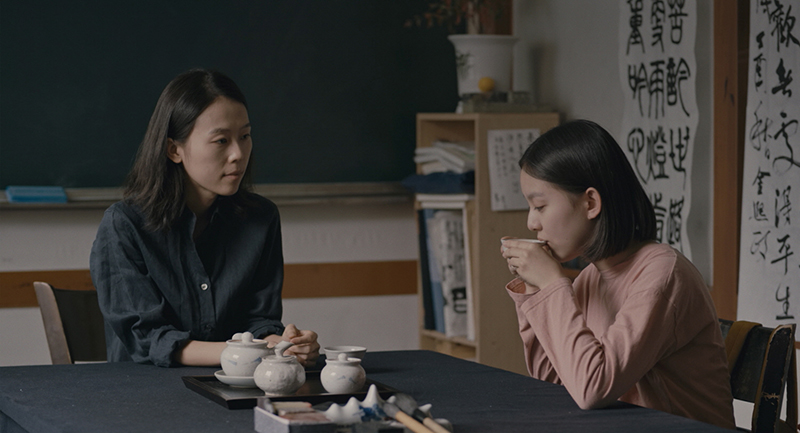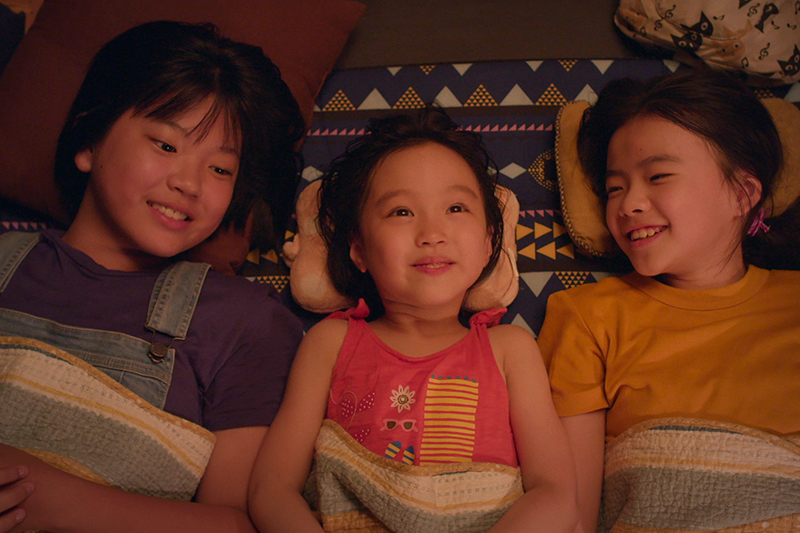
Director Kim Bora's debut film "House of Hummingbird" is a coming-of-age story about the experiences of a 14-year-old girl, Eun-hee. Pictured here is Eun-hee (right) drinking tea with her tutor Young-ji. (at9 film)
By Lee Hana
Small, independent films made by female directors have made big waves in Korea this past summer. Given how difficult it is for low-budget indie works to stay in theaters and sell over 10,000 tickets, the commercial success of Kim Bora's "House of Hummingbird" and Yoon Ga-eun's "The House of Us" is considered exceptional.
Kim's debut feature is a coming-of-age drama set in 1994 Seoul that follows Eun-hee, a rebellious 14-year-old who slowly learns to navigate life after forging a bond with her cram school tutor Young-ji. Since its premiere at last year's Busan International Film Festival, the movie has earned 25 awards at major cinematic events over the past year including the Berlin International Film Festival and the Tribeca Film Festival.
When "Hummingbird" was released on Aug. 29, it quickly gained a fan following and the number of screens was increased to meet surging demand. Now in its fourth week in theaters, the film has sold over 98,000 tickets and counting.
The Hollywood Reporter described "Hummingbird" as a "sensitive, keenly observed and unflinchingly honest debut feature" to which the director brings "an unblinking and feminine eye."
"The House of Us" is the follow-up to "The World of Us," Yoon's first feature film that drew considerable attention in the festival circuit in 2016. Much like her debut work, "House" explores the world of children, though this time, the protagonist Ha-na and sisters Yoo-mi and Yoo-jin band together to prevent their families from breaking apart, learning valuable lessons along the way.
Released on Aug. 22 amid heavy media buzz and critical acclaim, "House" started off with a relatively small screen count of 147 but sold over 3,000 tickets on opening day. In its first month of release, the film sold more than 50,000 tickets.

Director Yoon Ga-eun's second feature "The House of Us" centers on three young girls who unite to keep their families from breaking apart. (Lotte Entertainment)
The female protagonists in both "Hummingbird" and "House" destroy the cookie-cutter mold of Korean commercial movies that typically centers on male characters and male-driven storylines. The female leads in these two films are three-dimensional and autonomous who think and act for themselves, while experiencing personal growth. In exploring these characters, the directors show their inner conflict as well as personal relationships and lingering social issues with realism and depth.
Kim and Yoon said both of their films were based on their personal experiences. Rooted in memories from their days of youth, both works have thus resonated with audiences both young and old.
Kim told media briefings that she created "Hummingbird" by piecing together her memories, trauma and old wounds, while Yoon also said her latest feature, just like her previous work, "tells an unfinished story of feelings I had as a young girl."
On Sept. 6, the two directors held a meet-and-greet for the public at Lotte Cinema of Seoul's Lotte World Tower, during which Yoon explained her feelings on making her second film.
"There's a story I want to tell as a female director, but I began production on 'The House of Us' with a fear that I might not be able to communicate my story to an audience in our current market. What's changed is that unlike three years ago, movies made by other female directors are now showing in theaters alongside mine. This to me is often a great source of strength," she said.
The two directors are part of a female cinema wave rolling in Korea in recent months. "Ghost Walk," a fantasy drama by Yu Eun-jeong was released in mid-August, and Lee Ok-seop's "Maggie" and Han Ka-ram's debut "Our Body" hit screens in the final week of September.
Moviegoers in Korea can expect more from the emergence of female directors and their stories, told with awareness and sensitivity.
hlee10@korea.kr